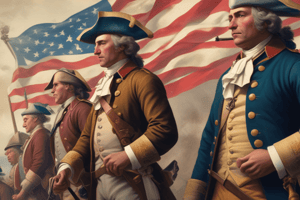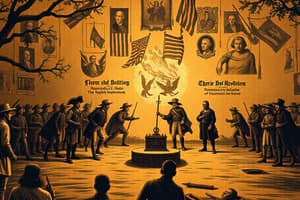Podcast
Questions and Answers
What was the primary cause of the American colonies' growing conflict with Great Britain between 1774 and 1776?
What was the primary cause of the American colonies' growing conflict with Great Britain between 1774 and 1776?
- Desire for territorial expansion
- Opposition to the Intolerable Acts (correct)
- Desire for independence
- Support for Loyalist policies
Which colonies did not send delegates to the First Continental Congress?
Which colonies did not send delegates to the First Continental Congress?
- Pennsylvania
- Georgia (correct)
- New York
- Virginia
Who were the members of the radical faction at the First Continental Congress?
Who were the members of the radical faction at the First Continental Congress?
- Samuel Adams and Patrick Henry (correct)
- Thomas Paine and Benjamin Franklin
- George Washington and John Dickinson
- John Jay and Joseph Galloway
What was the main purpose of the First Continental Congress?
What was the main purpose of the First Continental Congress?
Which delegate's views were considered conservative during the First Continental Congress?
Which delegate's views were considered conservative during the First Continental Congress?
Which statement best reflects the overall sentiment of most Americans in the lead-up to the American Revolution?
Which statement best reflects the overall sentiment of most Americans in the lead-up to the American Revolution?
What did Thomas Paine's Common Sense emphasize?
What did Thomas Paine's Common Sense emphasize?
Which statement about loyal colonists during this period is accurate?
Which statement about loyal colonists during this period is accurate?
Flashcards are hidden until you start studying
Study Notes
The Intolerable Acts and the American Response
- The Intolerable Acts were passed by Parliament in 1774, escalating tensions between the American colonies and Great Britain.
- The Acts were seen as punitive measures aimed at punishing the colonies for the Boston Tea Party and other acts of defiance.
- By 1776, many Americans concluded that severing ties with Britain was the only solution to their grievances.
The First Continental Congress
- Convened in September 1774 in Philadelphia, attended by delegates from all colonies except Georgia.
- Aimed to address British infringements on colonial liberties rather than seeking full independence initially.
- Delegates sought to restore the relationship with Britain to what it had been before the Seven Years' War.
The Delegates of the First Continental Congress
- Delegates represented a wide spectrum of political views: radical, moderate, and conservative.
- Key radicals included:
- Patrick Henry (Virginia) - voiced strong opposition to British rule.
- Samuel Adams (Massachusetts) - a fervent advocate for colonial rights.
- John Adams (Massachusetts) - supported strong measures against British oppression.
- Moderates included:
- George Washington (Virginia) - sought a balanced approach and wary of conflict.
- John Dickinson (Pennsylvania) - pushed for reconciliation with Britain.
- Conservative voices included:
- John Jay (New York) - favored a restrained response to British actions.
- Joseph Galloway (Pennsylvania) - supported a measure of loyalty to the crown.
- Loyalists were not represented at the Congress, indicating a growing divide in colonial stance against British authority.
Studying That Suits You
Use AI to generate personalized quizzes and flashcards to suit your learning preferences.




